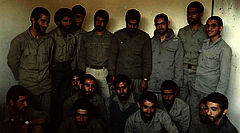Khamenei’s Rep: Israel Should Expect a “Harsh Response”
» Following the Killing of an IRGC Commander in Syria
Following the killing of an Iranian Revolutionary Guard commander close to general Ghasem Soleymani and the official confirmation of his death by the public relations office of the IRGC, a senior commander of the force announced that Israel would see a “harsh response” in the coming days as the response for the act.
Speaking to reporters General Yadollah Javani – ayatollah Khamenei’s representative in the IRGC force - told a news agency affiliated with the country’s official news agency that, “In the coming days the Zionist regime will receive a response to its criminal action.”
Javani called Israel’s attack a “policy mistake” and added, “What the Zionists have done indicates that they are in direct cooperation with terrorist groups in Syria and particularly with al-Nusra terrorist group. In fact one can say that their act was to help the terrorist in Syria as a way to strike at Hezbollah and throw Syria into a challenge again.”
According to this former head of the IRGC’s political office, “The Zionist regime believes that it can weaken Lebanese Hezbollah through such actions but in view of what we have witnessed before, such a thing will never happen and the reality is that whatever action the Zionist regime takes to weaken Hezbollah will result in strengthening it. This specific action will have the same result. When the Zionists receive Hezbollah’s decisive and hard response they will realize that not only has Hezbollah not become weaker, in reality it has become even stronger and its position is elevated.”
At the same time, the secretary of Iran’s national security council Ali Shamkhani told the visiting minister of interior of Iran, “Past experience shows that the resistance movement will give a response to the Zionist regime’s terrorist act that will be hard, revolutionary decisive and will be at a time and place of its own choosing.”
Last Sunday, international news agencies reported that six members of Hezbollah and an IRGC general were killed when Israel attacked a convoy carrying members of Lebanese Hezbollah in Syria. Among those killed was Revolutionary Guard general Mohammad Alioladadi and Jihad Moghnie, the son of Emad Moghnie, the former commander of Lebanese Hezbollah force who had been killed earlier because of his close ties to Iranian general Ghasem Soleymani who heads the Ghods Force of the IRGC.
General Alioladadi is the second senior commander of the Ghods Force to be killed in a month in the course of fighting. General Hamid Taghavi was killed by a ISIL sniper earlier in Iraq’s Samara province.
In a statement issued by the Revolutionary Guards public relations office, general Alioladadi was named as a former commander of the Alghadir force in Iran’s province of Yazd. It said he had been in an “advisory” role for the “people and government of Syria in a fight against Takfiri-Salafi terrorists.”
A website belonging to the Kerman province Sarollah force belonging to the IRGC wrote that Alioladadi was a commander of its force who had fought alongside with general Soleymani during the 8-year Iran-Iraq war.
Photographs from the Iran-Iraq war show general Aliodadi standing next to general Soleymani.
Authorities from the IRGC in recent years have repeatedly been denying reports that its forces or personnel were engaged in Syria and Iraq and had said that “Iran did not need to be militarily present in Iraq or Syria,” adding that Iran was there in an advisory role on defense matters.
Senior Iranian military authorities use the term “resistance front” and “resistance axis” for Lebanon, Syria and Iraq and believe that by supporting these government or groups that are aligned with the Islamic republic of Iran they are in fact adding a “strategic depth” to the country and preventing a direct military contact with Israel. General Soleymani for example, used this logic when speaking at a session of the Assembly of Experts last year when he said, “Some people criticize the level of our support for Syria about which they must be told that we do not pay attention to the propaganda of the enemy because Syria is at the resistance front, which is undeniable. We have a responsibility to support Muslims because they are under pressure.”
Cleric Ali Saeedi also had told Mizan news agency affiliated with Iran’s judiciary that, “the frontiers of the Islamic republic of Iran extend from Shalamche to Mehran and the Persian Gulf to the furthest points in the Middle East. Today the strategic depth of the Islamic republic of Iran stretches from the shores of the Mediterranean, the Bab-al Mandeb straits and West Asia. The Islamic republic has succeeded in pressuring the system of global arrogance (a reference to the United States and its allies) through its growing might.”



